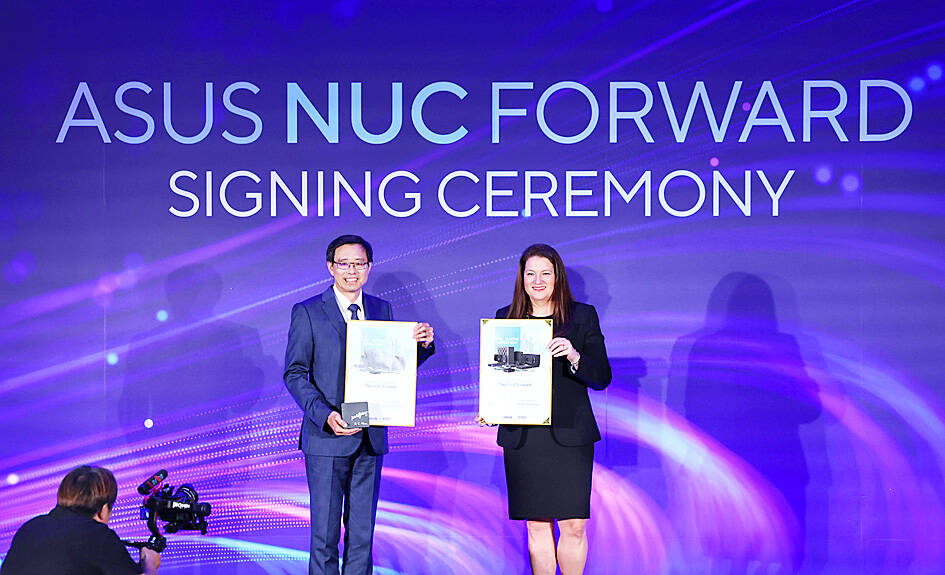Asustek Computer Inc (華碩) yesterday signed an agreement with Intel Corp to take over the US chip giant’s compact computer business, dubbed the “next unit of computing” (NUC), allowing Asustek to design, manufacture and sell Intel’s 10th to 13th-generation NUC product lines.
Asustek has created a new NUC business unit to develop future generations of NUC products and to handle Intel’s NUC clients, mostly PC vendors, Asustek said. Asustek plans to combine its existing mini-PC business with the new NUC unit, leading to a further workforce expansion to about 160 engineers at present.
Based on the agreement, Asustek does not own the exclusive right to develop and sell Intel’s NUC products. However, Asustek would have access to Intel’s NUC-related intellectual property, which is not available to other vendors of mini-PCs based on Intel’s NUC platform, the company said.

Photo: CNA
“Our established technical expertise and consistent track record in delivering industry-leading mini-PCs to customers position us perfectly to spearhead innovation and drive further growth in NUC system products,” Asustek chairman Jonney Shih (施崇棠) told a news conference in Taipei yesterday.
“I am confident that this collaboration will enhance and accelerate our vision for the mini-PC and will extend Asustek’s artificial intelligence-of-things (AIoT) and research-and-development capabilities and technology solutions.”
Asustek said it released price lists to its channel partners last month, paving the way for the PC vendor to roll out its new own-brand NUC products in January. Prior to the NUC launch, Asustek is to resell Intel-branded NUC products to assist customers through the transition period that could last for one quarter.
Intel has shipped more than 10 million Intel-based NUC products to customers around the world since the compact computer was first introduced to the market.
The latest partnership with Intel will “create synergies for Asutek,” Jackie Hsu (許佑嘉), a senior vice president and cohead of Asustek’s Open Platform and AIoT Business Groups, told reporters yesterday.
The compact PC series targets gaming PC users, and commercial and industrial users, Hsu said.
“Asustek will introduce the new NUC model to users of its ROG-brand gaming product lines,” she said.
In addition, the introduction of new Intel NUC lines would help deliver AI applications on edge devices, Asustek said. The company has established an AI team of 300 software development engineers, it said.

Semiconductor business between Taiwan and the US is a “win-win” model for both sides given the high level of complementarity, the government said yesterday responding to tariff threats from US President Donald Trump. Home to the world’s largest contract chipmaker, Taiwan Semiconductor Manufacturing Co (TSMC, 台積電), Taiwan is a key link in the global technology supply chain for companies such as Apple Inc and Nvidia Corp. Trump said on Monday he plans to impose tariffs on imported chips, pharmaceuticals and steel in an effort to get the producers to make them in the US. “Taiwan and the US semiconductor and other technology industries

SMALL AND EFFICIENT: The Chinese AI app’s initial success has spurred worries in the US that its tech giants’ massive AI spending needs re-evaluation, a market strategist said Chinese artificial intelligence (AI) start-up DeepSeek’s (深度求索) eponymous AI assistant rocketed to the top of Apple Inc’s iPhone download charts, stirring doubts in Silicon Valley about the strength of the US’ technological dominance. The app’s underlying AI model is widely seen as competitive with OpenAI and Meta Platforms Inc’s latest. Its claim that it cost much less to train and develop triggered share moves across Asia’s supply chain. Chinese tech firms linked to DeepSeek, such as Iflytek Co (科大訊飛), surged yesterday, while chipmaking tool makers like Advantest Corp slumped on the potential threat to demand for Nvidia Corp’s AI accelerators. US stock

The US Federal Reserve is expected to announce a pause in rate cuts on Wednesday, as policymakers look to continue tackling inflation under close and vocal scrutiny from US President Donald Trump. The Fed cut its key lending rate by a full percentage point in the final four months of last year and indicated it would move more cautiously going forward amid an uptick in inflation away from its long-term target of 2 percent. “I think they will do nothing, and I think they should do nothing,” Federal Reserve Bank of St Louis former president Jim Bullard said. “I think the

SUBSIDIES: The nominee for commerce secretary indicated the Trump administration wants to put its stamp on the plan, but not unravel it entirely US President Donald Trump’s pick to lead the agency in charge of a US$52 billion semiconductor subsidy program declined to give it unqualified support, raising questions about the disbursement of funds to companies like Intel Corp and Taiwan Semiconductor Manufacturing Co (台積電). “I can’t say that I can honor something I haven’t read,” Howard Lutnick, Trump’s nominee for commerce secretary, said of the binding CHIPS and Science Act awards in a confirmation hearing on Wednesday. “To the extent monies have been disbursed, I would commit to rigorously enforcing documents that have been signed by those companies to make sure we get